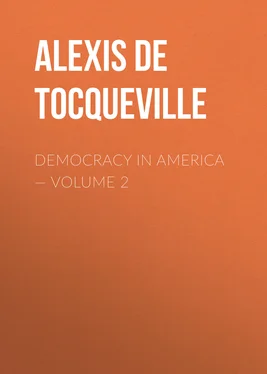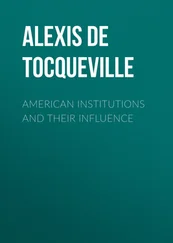Alexis de Tocqueville - Democracy in America — Volume 2
Здесь есть возможность читать онлайн «Alexis de Tocqueville - Democracy in America — Volume 2» — ознакомительный отрывок электронной книги совершенно бесплатно, а после прочтения отрывка купить полную версию. В некоторых случаях можно слушать аудио, скачать через торрент в формате fb2 и присутствует краткое содержание. Жанр: foreign_antique, Политика, foreign_edu, на английском языке. Описание произведения, (предисловие) а так же отзывы посетителей доступны на портале библиотеки ЛибКат.
- Название:Democracy in America — Volume 2
- Автор:
- Жанр:
- Год:неизвестен
- ISBN:нет данных
- Рейтинг книги:4 / 5. Голосов: 1
-
Избранное:Добавить в избранное
- Отзывы:
-
Ваша оценка:
- 80
- 1
- 2
- 3
- 4
- 5
Democracy in America — Volume 2: краткое содержание, описание и аннотация
Предлагаем к чтению аннотацию, описание, краткое содержание или предисловие (зависит от того, что написал сам автор книги «Democracy in America — Volume 2»). Если вы не нашли необходимую информацию о книге — напишите в комментариях, мы постараемся отыскать её.
Democracy in America — Volume 2 — читать онлайн ознакомительный отрывок
Ниже представлен текст книги, разбитый по страницам. Система сохранения места последней прочитанной страницы, позволяет с удобством читать онлайн бесплатно книгу «Democracy in America — Volume 2», без необходимости каждый раз заново искать на чём Вы остановились. Поставьте закладку, и сможете в любой момент перейти на страницу, на которой закончили чтение.
Интервал:
Закладка:
I have already shown in what way the equality of conditions leads every man to investigate truths for himself. It may readily be perceived that a method of this kind must insensibly beget a tendency to general ideas in the human mind. When I repudiate the traditions of rank, profession, and birth; when I escape from the authority of example, to seek out, by the single effort of my reason, the path to be followed, I am inclined to derive the motives of my opinions from human nature itself; which leads me necessarily, and almost unconsciously, to adopt a great number of very general notions.
All that I have here said explains the reasons for which the English display much less readiness and taste or the generalization of ideas than their American progeny, and still less again than their French neighbors; and likewise the reason for which the English of the present day display more of these qualities than their forefathers did. The English have long been a very enlightened and a very aristocratic nation; their enlightened condition urged them constantly to generalize, and their aristocratic habits confined them to particularize. Hence arose that philosophy, at once bold and timid, broad and narrow, which has hitherto prevailed in England, and which still obstructs and stagnates in so many minds in that country.
Independently of the causes I have pointed out in what goes before, others may be discerned less apparent, but no less efficacious, which engender amongst almost every democratic people a taste, and frequently a passion, for general ideas. An accurate distinction must be taken between ideas of this kind. Some are the result of slow, minute, and conscientious labor of the mind, and these extend the sphere of human knowledge; others spring up at once from the first rapid exercise of the wits, and beget none but very superficial and very uncertain notions. Men who live in ages of equality have a great deal of curiosity and very little leisure; their life is so practical, so confused, so excited, so active, that but little time remains to them for thought. Such men are prone to general ideas because they spare them the trouble of studying particulars; they contain, if I may so speak, a great deal in a little compass, and give, in a little time, a great return. If then, upon a brief and inattentive investigation, a common relation is thought to be detected between certain obtects, inquiry is not pushed any further; and without examining in detail how far these different objects differ or agree, they are hastily arranged under one formulary, in order to pass to another subject.
One of the distinguishing characteristics of a democratic period is the taste all men have at such ties for easy success and present enjoyment. This occurs in the pursuits of the intellect as well as in all others. Most of those who live at a time of equality are full of an ambition at once aspiring and relaxed: they would fain succeed brilliantly and at once, but they would be dispensed from great efforts to obtain success. These conflicting tendencies lead straight to the research of general ideas, by aid of which they flatter themselves that they can figure very importantly at a small expense, and draw the attention of the public with very little trouble. And I know not whether they be wrong in thinking thus. For their readers are as much averse to investigating anything to the bottom as they can be themselves; and what is generally sought in the productions of the mind is easy pleasure and information without labor.
If aristocratic nations do not make sufficient use of general ideas, and frequently treat them with inconsiderate disdain, it is true, on the other hand, that a democratic people is ever ready to carry ideas of this kind to excess, and to espouse the with injudicious warmth.
Chapter IV: Why The Americans Have Never Been So Eager As The French For General Ideas In Political Matters
I observed in the last chapter, that the Americans show a less decided taste for general ideas than the French; this is more especially true in political matters. Although the Americans infuse into their legislation infinitely more general ideas than the English, and although they pay much more attention than the latter people to the adjustment of the practice of affairs to theory, no political bodies in the United States have ever shown so warm an attachment to general ideas as the Constituent Assembly and the Convention in France. At no time has the American people laid hold on ideas of this kind with the passionate energy of the French people in the eighteenth century, or displayed the same blind confidence in the value and absolute truth of any theory. This difference between the Americans and the French originates in several causes, but principally in the following one. The Americans form a democratic people, which has always itself directed public affairs. The French are a democratic people, who, for a long time, could only speculate on the best manner of conducting them. The social condition of France led that people to conceive very general ideas on the subject of government, whilst its political constitution prevented it from correcting those ideas by experiment, and from gradually detecting their insufficiency; whereas in America the two things constantly balance and correct each other.
It may seem, at first sight, that this is very much opposed to what I have said before, that democratic nations derive their love of theory from the excitement of their active life. A more attentive examination will show that there is nothing contradictory in the proposition. Men living in democratic countries eagerly lay hold of general ideas because they have but little leisure, and because these ideas spare them the trouble of studying particulars. This is true; but it is only to be understood to apply to those matters which are not the necessary and habitual subjects of their thoughts. Mercantile men will take up very eagerly, and without any very close scrutiny, all the general ideas on philosophy, politics, science, or the arts, which may be presented to them; but for such as relate to commerce, they will not receive them without inquiry, or adopt them without reserve. The same thing applies to statesmen with regard to general ideas in politics. If, then, there be a subject upon which a democratic people is peculiarly liable to abandon itself, blindly and extravagantly, to general ideas, the best corrective that can be used will be to make that subject a part of the daily practical occupation of that people. The people will then be compelled to enter upon its details, and the details will teach them the weak points of the theory. This remedy may frequently be a painful one, but its effect is certain.
Thus it happens, that the democratic institutions which compel every citizen to take a practical part in the government, moderate that excessive taste for general theories in politics which the principle of equality suggests.
Chapter V: Of The Manner In Which Religion In The United States Avails Itself Of Democratic Tendencies
I have laid it down in a preceding chapter that men cannot do without dogmatical belief; and even that it is very much to be desired that such belief should exist amongst them. I now add, that of all the kinds of dogmatical belief the most desirable appears to me to be dogmatical belief in matters of religion; and this is a very clear inference, even from no higher consideration than the interests of this world. There is hardly any human action, however particular a character be assigned to it, which does not originate in some very general idea men have conceived of the Deity, of his relation to mankind, of the nature of their own souls, and of their duties to their fellow-creatures. Nor can anything prevent these ideas from being the common spring from which everything else emanates. Men are therefore immeasurably interested in acquiring fixed ideas of God, of the soul, and of their common duties to their Creator and to their fellow-men; for doubt on these first principles would abandon all their actions to the impulse of chance, and would condemn them to live, to a certain extent, powerless and undisciplined.
Читать дальшеИнтервал:
Закладка:
Похожие книги на «Democracy in America — Volume 2»
Представляем Вашему вниманию похожие книги на «Democracy in America — Volume 2» списком для выбора. Мы отобрали схожую по названию и смыслу литературу в надежде предоставить читателям больше вариантов отыскать новые, интересные, ещё непрочитанные произведения.
Обсуждение, отзывы о книге «Democracy in America — Volume 2» и просто собственные мнения читателей. Оставьте ваши комментарии, напишите, что Вы думаете о произведении, его смысле или главных героях. Укажите что конкретно понравилось, а что нет, и почему Вы так считаете.












